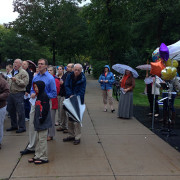God’s love and repentance
God’s love and repentance
God loves sinners. His love is undeserved and extends to all sinners of all kinds for all times. He loves the ungodly, the degenerate, and the unwilling—like Paul, who considered himself the worst of sinners (1 Timothy 1:15)
God’s love has a purpose. He loves to claim sinners and change their lives, bringing them into a close relationship with himself and altering their behavior. We don’t change in order to earn our acceptance from God. No, while we were still sinners Christ died for us. That love from God prompts us to follow his path, not our own. We are changed to love God and our neighbor—the two great commandments that summarize all of God’s commands (Matthew 22:37-40). We become new creatures and abandon our old sinful ways.
We understand the simple principle. But so many others do not understand either God’s love for sinners or the way it changes sinners. God loves all sinners just as they are—unbelievers; atheists; murderers; thieves; idolaters, including those who persecute and slaughter Christians, children, and families; homosexuals; adulterers; witches; violent disturbers of the peace. All of them. You can add to the list from any newspaper or discussion you encounter.
But God’s love is not tolerance. He does not pat sinners on the head and say, “There, there, I love you. It’s all okay.” He loved us sinners so much he gave his Son so we will have eternal life. But his love does not enable us to continue in our self-destructive ways. We don’t treat our children that way. We love them unconditionally, but we don’t stand by and allow them to continue in behavior that will bring them trouble or pain. We don’t let them attack their siblings or neighborhood children and say, “I love you, and it’s okay to do it again.”
We shouldn’t mock God by suggesting that he accepts and condones all behavior and all opinions. He has said something much different. When Jesus began his ministry, Mark and Matthew both identified his message, “Repent, for the kingdom of heaven is near” (Matthew 4:17; see also Mark 1:15). Repentance is always turning away from a wrong path to God’s. His path of gracious love and forgiveness brings change, but the path away from God’s leads into the abyss of self-destruction. So we turn toward what God wants by the very power he gives in the gospel.
It’s a simple principle even if our sinful natures want to distort and dilute it. Love is not tolerance. It does not excuse what is wrong. It does not enable the sinner to continue in sin. Does God love the murderer? Yes. It murder acceptable? No! When he says that sexual perversion is wrong, does he love those who participate? Yes! Does his love become only a bland and blind tolerance that enables it to continue? No! Does he love the domestic abuser? Yes. Does he excuse the violence? No! He threatens to punish all who transgress, but even that threat is a loving rebuke to lead to repentance and change.
We are to love God in gratitude that he first loved us and gave himself for us. We are also to love others—sinners of all kinds—just as he did but without enabling them to continue in sin and rebellion. Be ready, as Peter says, to respond with gentleness and respect (1 Peter 3:15). We seek to bring others to know Jesus so they may proclaim his light by their confession and by the way they live. It is God’s plan for us and for all sinners.
SUBMIT YOUR STORY
Do you have a manuscript, idea, or story from your own life you’d like to share for use in Forward in Christ or on wels.net? Use our online form to share it to our editorial office for consideration.
SUBSCRIBE TO FORWARD IN CHRIST
Get inspirational stories, spiritual help, and synod news from Forward in Christ every month. Print and digital subscriptions are available from Northwestern Publishing House.
Author: John A. Braun
Volume 102, Number 2
Issue: February 2015
Copyrighted by WELS Forward in Christ © 2021
Forward in Christ grants permission for any original article (not a reprint) to be printed for use in a WELS church, school, or organization, provided that it is distributed free and indicate Forward in Christ as the source. Images may not be reproduced except in the context of its article. Contact us





